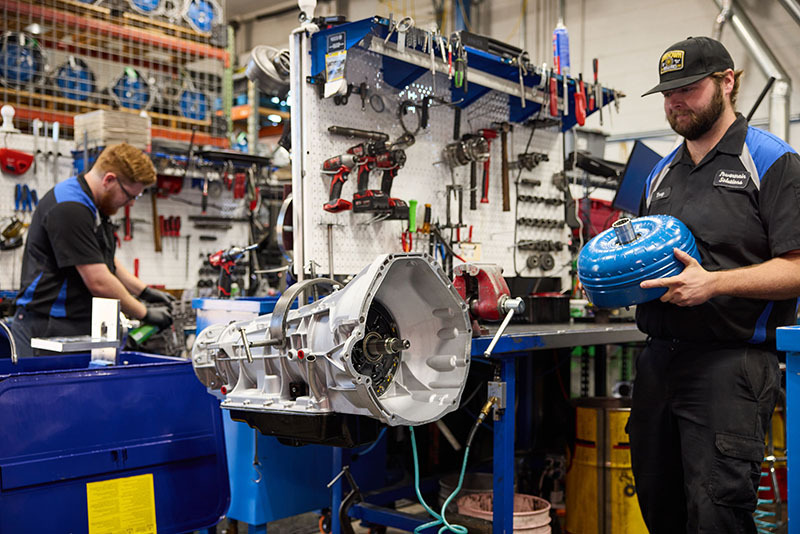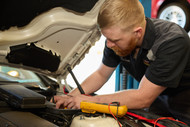26th Mar 2025
Regular Maintenance Tips from a Trusted Transmission Shop in Klamath Falls
Your transmission takes a beating, especially if you’re driving through the ups, downs, and seasonal swings of Klamath Falls. Between cold mornings, hot afternoons, and terrain that’s anything but flat, it’s no wonder your transmission works overtime. It's why regular maintenance is a must if you want to keep your car running smoothly for the long haul.
In this guide, we’re sharing key tips every local driver should know—straight from the kind of transmission shop Klamath Falls drivers trust.
Klamath Falls' Driving Conditions
Klamath Falls might be beautiful, but it’s not exactly easy on your transmission. The mix of weather and terrain here means your car’s transmission is constantly adjusting, adapting, and under pressure—literally.
Cold winters can thicken your transmission fluid, making it harder for your vehicle to shift smoothly. Cold starts and short drives can also lead to more wear and tear, especially if you're not giving your car enough time to warm up.
Hot summers, on the other hand, bring their own problems. High temps can cause your transmission to overheat, especially if you're hauling loads or driving in heavy traffic. And when transmission fluid gets too hot, it breaks down faster—losing the ability to lubricate and protect the gears inside.
Then there’s the terrain. If you're climbing hills or weaving through stop-and-go traffic, you're putting a lot of strain on your drive train. Frequent gear changes, heavy loads, and even just driving around town can wear down essential components like the clutch, torque converter, and internal seals.
Bottom line: your car’s transmission works hard in Klamath Falls. Understanding these local factors is the first step to keeping things running smoothly. The next step is staying ahead with smart maintenance.
How Local Conditions Wear Down Your Transmission
We’ve talked about how Klamath Falls’ weather and roads create tough conditions, but what does that actually do to your transmission over time?
Let’s start with cold-weather wear. When it’s freezing out, thickened transmission fluid takes longer to circulate, which means your gears aren’t getting the lubrication they need right away. Those few minutes of rough shifting in the morning? They slowly chip away at the health of your clutch plates and seals, especially if it happens every day.
On the flip side, summer heat makes your transmission work harder to stay cool. Long drives or heavy loads in high temps can cause your system to overheat—and when fluid starts to break down, it can’t protect internal components from friction and stress. That leads to slipping gears, inconsistent shifting, and potential fluid leaks.
And then there’s the terrain factor. Hills and constant gear changes put repetitive strain on your drive train and internal gears. Over time, that extra pressure wears out parts faster than they would on flat, easy roads. Uphill climbs can also push your transmission past its comfort zone if it’s already under-maintained.
These effects don’t happen overnight, but without regular inspections and fluid checks, they add up. And by the time you notice something’s wrong, you might already be looking at full transmission repair—or, in more severe cases, a complete transmission replacement.
Best Transmission Maintenance Practices

Regular maintenance might not be flashy but it’s what keeps your transmission out of trouble. And in a place like Klamath Falls, a few simple habits go a long way in avoiding breakdowns and costly repairs.
Check and change your transmission fluid.
Fluid is the lifeblood of your transmission. It keeps everything cool, lubricated, and shifting smoothly. Low or dirty fluid? That’s a fast track to overheating and internal damage. Your owner's manual will give you a basic interval, but local shops may recommend more frequent checks depending on your driving habits.
If you're towing, climbing hills, or driving in stop-and-go traffic, don’t wait too long—schedule that fluid service.
Get regular inspections.
Transmission issues usually start small—tiny leaks, strange noises, or subtle changes in how your car shifts. Catching them early makes a huge difference. A quick inspection can help spot problems before they turn into major repairs.
It’s especially smart to get your transmission looked at with seasonal changes or before long trips.
Adjust your driving habits.
Little things matter. Give your car a minute to warm up on those freezing Klamath mornings—cold fluid doesn’t flow well. And when you're behind the wheel, avoid slamming on the gas or shifting too aggressively. Smooth driving puts less stress on your clutch, gears, and overall system.
Taking care of your transmission isn’t complicated—stay consistent and be a little more mindful behind the wheel. Your future self (and your wallet) will thank you.
Schedule Service with the Local Transmission Experts
Between the climate, terrain, and everyday driving demands in Klamath Falls, your transmission has a lot to handle. Staying on top of regular maintenance is a must if you want to avoid major issues and keep your vehicle running strong. Fortunately, there is one shop you can trust that provides all types of transmission services.
Trust your transmission to Dusty's
Dusty’s Transmissions has been helping drivers across Southern Oregon keep their transmissions running strong for over 40 years. If you need a quick inspection, fluid replacement, or full transmission repair services, our experienced team knows how to handle it—automatic and manual transmission and everything in between.
We offer trusted service, straightforward warranties, and expert care from the kind of technicians who treat your vehicle like it’s their own.
Give us a call, schedule your appointment online, or just swing by the shop. We’re here to keep you moving—smoothly, safely, and confidently.
Frequently Asked Questions
Why is transmission maintenance important?
Because your transmission controls how power moves from your engine to your wheels, any small issue can quickly lead to major (and expensive) problems. Regular maintenance keeps everything running smoothly and helps you catch small issues before they turn into big ones.
Why is daily maintenance required for a vehicle?
Daily maintenance isn’t about doing major work—it’s about small habits that protect your vehicle over time. Checking fluid levels, listening for unusual noises, and warming up your car in cold weather all help extend the life of key components, including your transmission.
What is the maintenance of the transmission system?
Transmission maintenance includes checking and replacing fluid, inspecting for leaks or damage, replacing filters (if applicable), and ensuring all components are shifting properly. It also means paying attention to how your car drives—if shifting feels off, it’s time for a checkup.
What maintenance is required for an automatic transmission?
For automatic transmissions, the key steps include regular fluid checks and changes, monitoring for slipping or delayed shifting, and having the system inspected by a technician if anything feels off. Keeping the fluid clean and at the right level is especially important to prevent overheating and wear.



